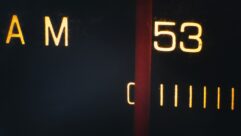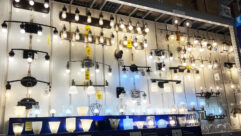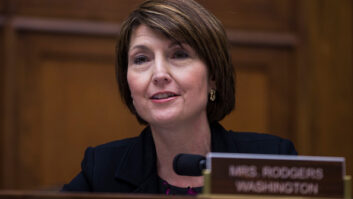Radio broadcasters from around the globe will cover the 2012 Olympic Games beginning with the opening ceremonies on July 27.
A total of 1,275 broadcast commentary positions are available when all venues are counted; each position accommodates one, two or three people. Approximately 18 percent of bookings for these commentary positions are from radio rights-holding broadcasters, or RHBs, according to Matt Mason, director of information and publications for Olympic Broadcasting Services.
OBS, an agency of the International Olympic Committee responsible for providing continuity in Olympic coverage, has been host broadcaster for all Olympics Games since 2008. Based on Mason’s numbers, radio broadcasters will occupy up to 288 commentary positions through the London Olympic Games site. BBC Radio will be use 46 of those, which is interesting to a large part of the readership of RW’s sister publication Radio World International.

Aerial shot of the Olympic stadium in London. Photo courtesy of the International Olympic Committee As part of what it’s calling the first “digital Olympics,” the BBC will provide coverage of the Games on a temporary station dedicated to the Games transmitting a DAB signal.
THE NITTY-GRITTY
Radio RHBs will be housed with television, print and other journalists at the International Broadcast Center. Located in the northwest corner of the Olympic Park, this multistory building is roughly 302 yards long, 114 yards wide and 23 yards tall, according to the IBC website, www.london2012.com/ibc-mpc.
Mason said some radio rights-holders have booked radio studios in the IBC and dedicated radio “mixed zone” positions. The radio studio facilities generally include office, control room and a studio.
The standard studio module of Olympic Broadcasting Services is just over 49 square yards, large enough to support a basic radio production facility. This said, many RHBs have requested custom-tailored facilities.
The mixed zone is an interview area at the venue for radio organizations and members of the written press to “mix” with athletes, conducting post-event interviews. The area is adjacent to the field of play, or as close as possible.
Then there are the commentary positions at the venues, where radio broadcasters can provide live coverage of actual Olympic competitions. The audio feeds from these locations are routed to the Commentary-Switching Center in the IBC.
The Commentary-Switching Center is the network’s main hub for coordination circuits and international sound for radio, or “IS-RA.” All RHB/OBS coordination and IS-RA circuits will terminate in the Commentary-Switching Center and may then be extended to the radio broadcasters’ spaces in the International Broadcast Center.
Beyond their own original coverage, radio rights-holders will have access to feeds provided by the Olympic Broadcasting Services, akin to its host broadcaster feeds for television rights-holders. OBS provides radio rights-holders with IS-RA produced for mix with their commentary feeds, said Mason. This will be available to the RHBs in the IBC, as part of their package, in either analog or AES/EBU format.
A LONG HISTORY
Radio began covering the Olympics in 1928, when the Games were held in Amsterdam. However, it was not until the 1936 Berlin Games that the medium reported the Olympics in depth.
According an OBS’ online history, “The 1936 Games received extensive radio coverage, as a total of 2,500 radio broadcasts were made in 28 different languages.”
At that same event, German television manufacturers Telefunken and Fernseh televised the 1936 Olympics to “public television offices” in Berlin and Potsdam. Approximately 162,000 viewers saw the televised games. That was far fewer than heard them on radio, but enough to spark the long-running relationship between television and the Games.
World War II resulted in the cancellation of the 1940 and 1944 Olympics. The Games resumed in 1948 with the so-called “Austerity Games” in war-ravaged London, where athletes used existing venues and housing. The BBC seized the opportunity to televise the event. But radio was still a major player: The BBC’s Broadcasting Center (inside the 1924-era Palace of Arts) had eight radio studios.
Today, 84 years since its first Olympic broadcast, radio remains an important part of Olympics coverage, according to Mason.
James Careless reports on the industry for Radio World from Ottawa, Ontario, Canada.









